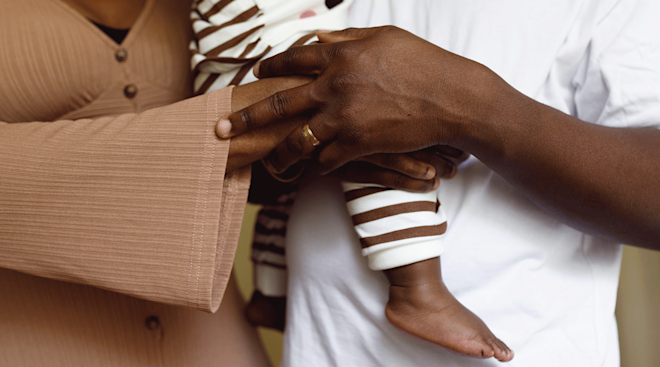How a Strong Marriage Benefits Baby
What if there was one thing that could boost baby’s development on a social, emotional and cognitive level? You’d probably order her that toy or enroll him in that class immediately, right? Here’s the thing: It has nothing to do with baby at all. It’s the connection between parents. You know—the exact thing that suffers when you bring a colicky newborn into the picture.
Before baby arrives, you and your partner have distinct patterns in your relationship. From how you get ready for bed to how you settle arguments, it’s all dictated by the two of you. Enter baby. Every single pattern changes for you, but not necessarily by you. Couples who don’t establish new ways of talking, connecting and dealing with conflict after becoming parents are at risk for major drops in marital satisfaction. So a married couple—parents-to-be, in fact—came up with a solution.
Steve and Rebecca Dziedzic co-founded Lasting, a science-backed marriage health app designed to be like marriage counseling on your own terms. (Think marriage counseling is just for couples in trouble? Think again! Here’s why counseling can be useful for all relationships.) After new parents take an assessment, the app will recommend areas that could use some work in your relationship, like communication or sex. Each day, five minutes worth of quizzes and exercises will help you proactively strengthen your marriage.
Lasting is for all married couples, not just new parents. But recognizing the fact that the first three years of raising a child are typically the unhappiest years of marriage, the Dziedzics have four tactics in mind just for moms and dads:
1. Be clear about what you want and what you need. Over the course of your relationship, your partner developed expectations about your wants and needs, and you did the same. But it’s not safe to assume that those remained static for either of you after baby arrived. Take some time for self-reflection. How have your wants and needs changed? Once you’ve nailed them down, directly, clearly and gently communicate them with your partner.
2. Find new ways to connect. Before baby, maybe you cooked together religiously or took a road trip every month. Data from Lasting shows about 60 percent of couples haven’t created new connection rituals together since becoming parents. Consciously think about what you are and aren’t doing to connect as a couple and adjust accordingly—even if that just means making time for morning coffee together. Emotional connection is the foundation of your marriage. If you don’t find ways to keep connecting, your emotional connection will plummet.
3. Work together to create positive experiences for baby Before he can even walk, baby’s brain has already developed the neural pathways that facilitate learning, solving problems, building relationships and managing stress. He can take a lot in, and your behavior and interactions do not go unnoticed. From tone of voice to body language, the way you and your partner interact leaves a deep impression on your child.
4. Cool off when you need to. Lack of sleep can do funny things to your brain. In an emotional reaction called flooding, your brain’s hypothalamus signals your adrenal glands to produce adrenaline and other stress hormones, especially during an argument. From there, you lose your ability to be rational, solve problems, and, unfortunately, be empathetic. You are literally too overwhelmed to think clearly or to listen to your partner. Create a signal for when one of you gets flooded. That’ll inform the other person that it’s time to take a break and return to the debate later.
Find these scientific insights (and more) in the Lasting app, which you can download here.
Published March 2018
Navigate forward to interact with the calendar and select a date. Press the question mark key to get the keyboard shortcuts for changing dates.




















































